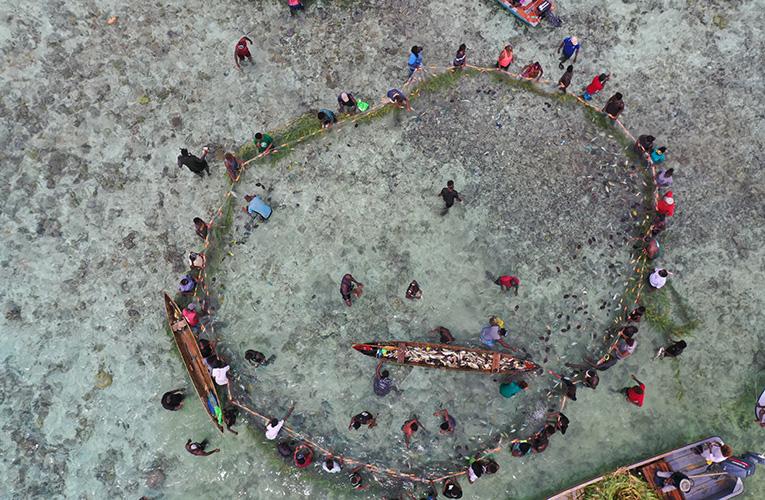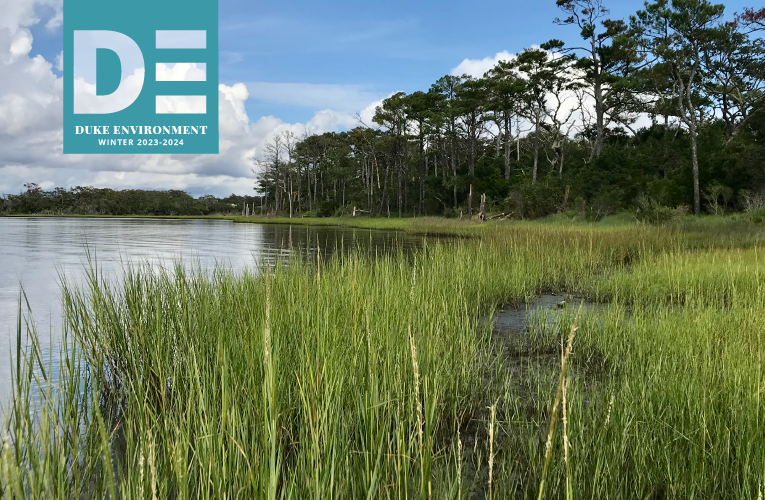DURHAM, N.C. – Four students at Duke University’s Nicholas School of the Environment traveled to Costa Rica this summer to conduct research for a fully funded, client-centered group masters project investigating the health of a 32-acre red and black mangrove forest.
Client-centered group masters projects are a new initiative being offered at the Nicholas School (see related story).
Derek Fedak, Carolina Rodriguez, Adam Spitzig and Marie Windstein spent seven weeks immersed in research and planning at the Flamingo Beach Resort and Spa in the Guanacaste region of northwestern Costa Rica.
They will present their results at the Nicholas School Master's Project Symposium in April 2011.
Red and black mangroves comprise two of the four mangrove plant families found along the Costa Rican coast. Mangrove forests are an ecosystem valued for the complex and often underappreciated habitat they provide for developing marine and estuarine species, says the students’ advisor, Curt Richardson, director of the Duke University Wetlands Center and professor of resource ecology. Mangroves are also credited with protecting coastal areas from erosion and other wave action.
The four Nicholas School students worked towards two objectives: conducting a general ecological assessment of a mangrove forest adjacent to the Flamingo Beach Resort, and securing a Costa Rican government-issued Certification in Sustainable Tourism for the resort. Documenting that the mangroves were largely unpolluted was critical to help authenticate the resort’s low impact on the surrounding environment.
Rodriguez’s parents Pam and Carlos Rodriguez own the resort and provided a grant that covered the project’s costs, including transportation, housing, room and board, and a stipend.
The Rodriguezes also wanted to explore the option of creating an educational boardwalk through the mangroves to help locals and visitors learn more about the importance of mangrove systems.
“This was a really good example of individuals who could tap into the resources of the Nicholas School and have it benefit both their business and the student academic experience,” said Karen Kirchof, assistant dean of Career Services.
While Spitzig and Rodriguez tackled the ecocertification paperwork, Fedak and Windstein spent many muddy days in the forest mapping the mangrove system, measuring geochemistry and water quality levels, and monitoring vegetation and wildlife.
The team tried to engage the community in their work as much as possible, Fedak said. They organized a community clean-up, amassing over 60 bags of trash around the mangrove’s edges. He and Windstein also gave a lecture on their research to local middle and high school students, who were so interested in learning about the mangrove system that they offered to conduct additional field projects on the mangroves once the Duke team had left.
“It’s reassuring to know we left the mangroves in their hands,” said Fedak.
Feet now out of the Flamingo Beach mangrove forest mud and planted firmly on North Carolinian soil, the team has been busy running analyses on their data, which they hope will confirm scientifically the mangrove’s visible appearance of health. Considerable paperwork also remains to be processed and submitted to help the resort earn a Certification in Sustainable Tourism, Fedak says.
Richardson, anticipates that one of the key outcomes of the project will be “showing that in fact this is a wonderful mangrove, that it’s ecologically very rich in diversity, and that it’s an excellent resource for the bay community.”
Fedak is pursuing his Master of Environmental (MEM) degree in Ecosystem Science and Conservation. Windstein is pursing hers in Global Environmental Change. Spitzig is pursing concurrent MEM and Juris Doctor degrees; his MEM concentration is Ecosystem Science and Conservation. Rodriquez is an undergraduate at Duke who is pursuing a degree in Environmental Sciences and Policy. She is earning independent study credits for her part in the project.



